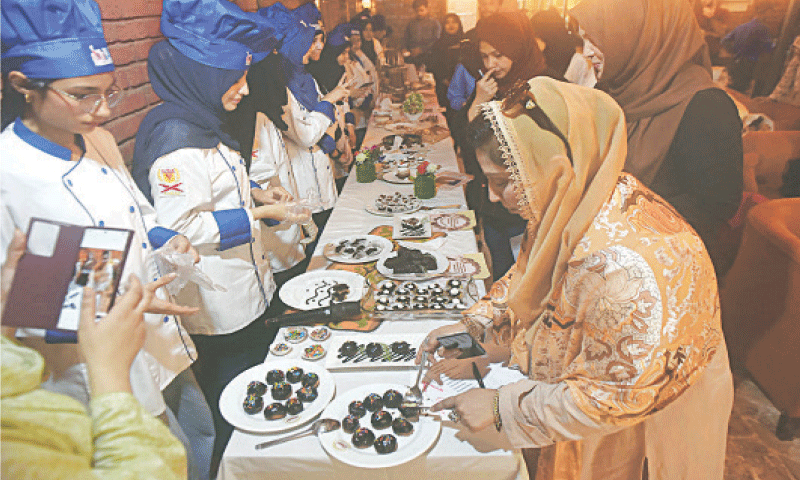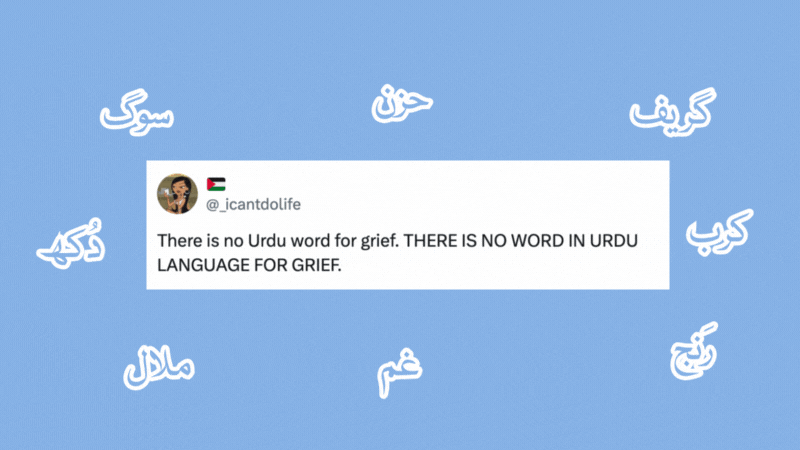Are you an 'obedient' Pakistani daughter? This novel asks why
When it comes to suppressing anger, there's no doubt Pakistani girls do it best.
After all, your typical Pakistan girl has a lot to be angry about. From the day she's born she's taught to defer to her elders and told: "achi larkian aagay say jawaab nahi detein (good girls don't talk back)." Grandparents cite examples of distant relatives whose daughters went 'astray' and even if this loitering from the path meant the girls in question chose to study law instead of literature, the message is clear. And that's just the tip of the iceberg — there's lots more in society to be enraged about.
So where does all this pent-up frustration go? Does it simmer for years only to surface at inopportune moments,forcing you to overturn a daig of biryani onto your insufferable cousin's head?
 |
| The book's cover page. — Photo: Ayesha Tariq |
I recently came across a book that answers this question.
The Suppressed Anger of the Pakistani Obedient Daughter is Ayesha Tariq's brainchild and a hilarious take on the struggles attached to being a Pakistani daughter.
I came across Ayesha's work at Dastaan-e-Pakistan — a comic-con recently held in Karachi, and fell in love with the book even though it’s not officially published.
The story behind the book:
Written and illustrated by Ayesha Tariq in 2011, ‘The Suppressed Anger of the Pakistani Obedient Daughter’ (which was her university thesis) revolves around a teenager named Sarah who always does as she’s told and suppresses her anger.
The book chronicles Sarah's daily trials and how she bottles up her frustration so that it doesn’t hurt her parents. But there’s only so much a bottle can hold. Towards the end of the book, Sarah’s pent up anger is about to explode as she sets out to make changes and what happens next is pretty fun to read.
“The idea of this book came to me after a fight with my family,” Ayesha told me.
Belonging to an average Pakistani family (as some would say), societal perceptions played an important role in Ayesha’ upbringing. She felt it was important for her to be aware of what her immediate as well as her extended family thought of her actions.
 |
“This book stemmed from a lot of anger that I felt and I started making a list of things that all my female friends and I went through,” Ayesha explained. “I realised with time that this book wasn’t just an account of my life, I was speaking up for a lot of women in Pakistan.”
Sarah, the protagonist belongs to an urban middle-class family. But her hopes and dreams are often neglected thanks to the chains of patriarchy that bind her.
“Sarah could be any of us, any of us could be Sarah,” said Ayesha.
 |
Ayesha also took inspiration from the novels and comic strips that she likes to read, which take mundane day-to-day events and transform them into meaningful moments. Calvin and Hobbes, Nate, Baby Blues, Archie, Aunty Acid, The Simpsons and comics by Sarah Anderson are a few illustrations and stories that inspire Ayesha.
South Asian literature, drama and film have also been an inspiration for her. But the most significant inspiration of them all is the people around her.
“The most deep-rooted inspiration for me is my life and the people I am surrounded by, and of course the monologues I have inside my head,” said Ayesha.
 |
From thought to paper — how did she do it?
Writing and illustrating this book required a great deal of research which mainly consisted of heated discussions with a number of angry women. Ayesha also sifted through her old journals and eventually listed down all the ideas that helped her design the character of Sarah and her family.
“The illustrations involved a lot of photographic references and sketching. I had my family and friends pose in various awkward postures,” said Ayesha.
The setting of ‘The Suppressed Anger of the Pakistani Obedient Daughter’ was mainly inspired by Askari Apartments 2 in Karachi, where Ayesha once lived. After sketching what she had in mind, Ayesha scanned and took photographs of the sketches and used a pen tablet to draw the illustrations on Adobe Illustrator.
“I made a tiny black and white version of the book before I took it to final printing. Once the pages were printed in colour in the size I wanted, I manually cut and pasted them together myself, and got it bound in hard cover,” said Ayesha.
There's always a bad guy...
When it comes to other characters in the book, there are a few ‘villains’ in Sarah's life. She is like a fly stuck in a web where various spiders, some worse than others, may attack her.
First, we see her immediate family who is oblivious to how they affect her and stifle her dreams. Her brother, for instance, always gets what he wants and also falls prey to the notion that his sister must play the roles prescribed to her by society.
 |
There is of course, the rishta aunty, (no story on the life of a Pakistani teenager could be complete without one of those) who ignores Sarah’s feelings and subjects her to introductions with strange men who objectify her. And then there are other women in Sarah’s life who may be family friends, but instead of being empathetic, they feel entitled to criticise Sarah’s behavior, appearance and lifestyle choices.
The book also features a sleazy uncle, who serves as a metaphor for the various instances of sexual assault a girl may face in her day-to-day life. This character also paints a picture of how the involvement of family members can make circumstances like harassment tremendously difficult to discuss.
 |
The future:
Although The Suppressed Anger of the Pakistani Obedient Daughter humorously examines the plight of young girls growing up in urban Pakistan, there comes a point when this suppressed anger becomes a deeper issue psychologically since everyone has a different threshold for the amount of suppression they can endure.
“The Pakistani obedient daughter may have a lot of pent up anger, unfulfilled dreams and resentment that will follow her down the line. Instead of directly communicating, a lot of Pakistani obedient daughters will display passive-aggressive behavior,” Ayesha explained. “I feel much more empowered since I wrote the book and addressed various issues, though I don’t think addressing these issues is a luxury that everyone has.”
 |
“It was definitely cathartic for me to write and illustrate this book,” continued Ayesha. “I feel when others look at it, they would probably say, ‘Hey! I know that feeling! I went through the same.’ I want them to realize that they are not alone. They can collectively fight against this.”
The book was fairly well received at Ayesha’s thesis display where she got a very positive response from all visitors, including her family. Women and young girls gathered around and read out their favourite parts to their friends.
“That made me feel a sense of validation and that the purpose behind writing this book was being fulfilled,” Ayesha confessed.
Unfortunately, Ayesha is yet to find publishers willing to publish The Suppressed Anger of the Pakistani Obedient Daughter despite trying in the past.
“I would love to have my book published. I did coordinate with a few publishers but the subject matter is too risqué to be mass-produced, I suppose,” revealed Ayesha.
In a country where going for therapy is somewhat of a taboo, its highly important for a book like The Suppressed Anger of the Pakistani Obedient Daughter to hit the shelves for all young girls struggling to find a voice in a society where it is silenced most of the times.
Interested in seeing more? You can view more illustrations on the artist’s website.









